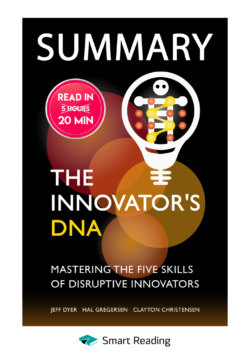Читать книгу Summary: The Innovator’s DNA. Mastering the Five Skills of Disruptive Innovators. Jeff Dyer, Hal Gregersen, Clayton Christensen - Smart Reading, Ольга Ганкова - Страница 3
What makes innovators different?
ОглавлениеMany people are convinced that people are endowed with creativity by nature: it’s just that some people’s right hemisphere is better developed and, as a result, so it their intuition. However, research results disprove this misconception.
The most comprehensive study of the origin of creativity was done by a group of researchers, Merton Reznikoff, George Domino, Carolyn Bridges, and Merton Honeyman. They studied the creative abilities of 117 pairs of twins aged 15 to 22 and found that only about 30 % of the creative activity of identical twins had a genetic origin. In contrast, roughly 80 to 85 percent of the general intelligence (IQ) tests could be attributed to genetics.
So general intelligence is basically a genetic endowment, but creativity is not. About two-thirds of innovative skills are acquired during the learning process. Our environment also affects our ability to develop creativity. Societies that promote community versus individualism and hierarchy over merit – such as Japan, China, Korea, and many Arab nations – are less likely to innovate or produce a Nobel Prize winner.
The authors of this book studied about 500 innovators out of 5,000 heads of companies and were able to identify five discovery (research) skills that distinguish innovators from ordinary leaders. First and foremost, innovators count on a cognitive skill that we call "associational thinking" or simply "associating". Other discovery skills, questioning, observing, networking, and experimenting, are all behavioral in nature. These discovery skills, combined with innovative courage, form the innovator’s DNA model, or the source code for generating innovative business ideas.
